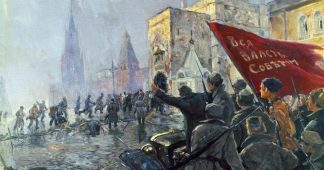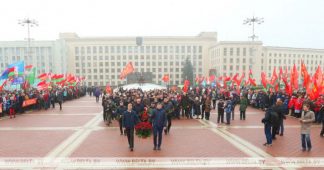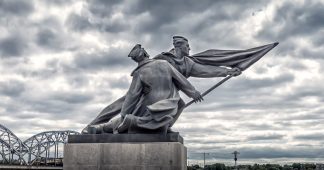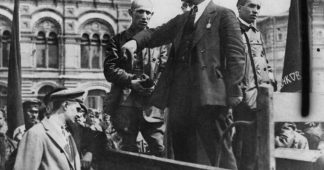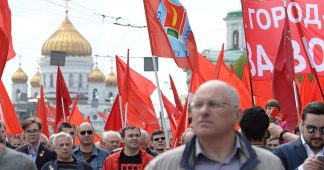By Clara Weiss
19 November 2019
On October 27, 2019, Vladimir Bukovsky, a well-known Soviet dissident and critic of Vladimir Putin, died in the UK.
Falsely presented in obituaries in the Western press and by Russian liberals as the “conscience” of Russia and one of the most important critics of Russian president Vladimir Putin, Bukovsky died in political and moral disgrace with a record of right-wing politics that spans almost half a century.
Bukovsky was arguably the most famous political prisoner in the Soviet Union of the post-war period. Having spent 12 years of his life in prison camps and prisons, where he was subject to prolonged psychological torture and solitary confinement, he was expelled from the Soviet Union in 1976 and spent the rest of his life in Great Britain. An embittered anti-Communist by the late 1970s, he worked as an advisor to Prime Minister Margaret Thatcher and lobbied US President Ronald Reagan to take a more belligerent stance on the Soviet Union in the 1980s.
He concluded his life at the age of 76, having served as an advisor to Britain’s far-right UKIP party leadership. He was also on the advisory board of multiple extreme right-wing think tanks, including the Cato Institute of the Koch brothers, and the Victims of Communism Memorial Foundation. In the last years of his life Bukovsky was also charged with the possession of child pornography, a charge he de facto admitted when the police raided his home, finding him downloading pornographic materials. While his lawyers, unsurprisingly, sought to argue that it was the Kremlin that had Bukovsky’s computer hacked, the trial against him was only dropped because of his poor health.
An understanding of Bukovsky’s life and role in politics over the past half century must be placed within the broader context of the development of the October Revolution of 1917 and the Stalinist reaction against it.
Bukovsky was born in the Autonomous Soviet Republic of Bashkir in 1942, one year after the Nazis had invaded the Soviet Union. In the years before the war, the Stalinist bureaucracy, which had emerged in the Soviet Union under conditions of international isolation of the October Revolution of 1917, had unleashed a campaign of terror and mass murder. It targeted, above all, the Bolshevik party cadre that had led the revolution of 1917, socialist workers and intellectuals more generally, and the 30,000 members of the Trotskyist movement in the Soviet Union. This campaign culminated in the assassination of Leon Trotsky, who had led the struggle against the nationalist betrayal of the October Revolution and in defense of socialist internationalism, in 1940 in Coyoacan, Mexico.
Bukovsky’s parents were descendants of the “old Russian intelligentsia” and loyal members of the Communist Party who survived the Great Terror unscathed. His father, who joined the CPSU in 1931, was a well-known journalist who wrote for the prominent Soviet journal Ogonyok.
After the end of the war, which had left at least 27 million Soviet citizens dead, Bukovsky’s family returned to Moscow. With much of the country still in ruins, an entire generation of young men lost to the war, and the population still struggling with food shortages, post-war Moscow became the scene of yet another wave of purges in the immediate postwar period. As the Cold War began, Stalin initiated a campaign of terror and purges targeting above all the intelligentsia, and increasingly, the Jewish intelligentsia. In 1952, the anti-Semitic campaign of the bureaucracy reached its climax with the so called “Doctor’s Plot,” in which Stalin accused his Jewish doctors of seeking to poison him.
In his memoirs from 1977, Bukovsky recounts in a manner quite unfavorable to himself that he was extremely susceptible to the anti-Semitic sentiments that had been whipped up by the bureaucracy.
After the death of Stalin in March 1953, there was a significant change in the political and intellectual climate. In February 1956, Nikita Khrushchev, the new general secretary of the Communist Party, felt compelled to acknowledge some of Stalin’s worst crimes in his “secret speech” to the XXth Party Congress. The crisis of the Stalinist bureaucracy was provoked above all by an eruption of working class opposition to its rule, in East Germany in 1953 and in Hungary and Poland in 1956. In the Soviet Union itself, there were growing social tensions and an uprising by workers in Novocherkassk in 1962 was bloodily suppressed by the bureaucracy.
These developments radicalized a new generation of youth and intellectuals in the USSR. Many of those who later became well-known dissidents, including Lyudmila Alexeyeva who also recently died, began studying Lenin’s Collected Works, in search for a true Marxism and Leninism that they felt had been betrayed by the party in power. Andrey Sinyavsky, who would later also turn to the right, wrote his first novel about one of the anti-Stalinist youth groups in the early 1950s that sought to base their criticism of Stalinism on the few writings that they had found of Leon Trotsky.
Bukovsky, too, turned to reading Lenin. However, in his memoirs To Build a Castle, published in 1977, he insists that all he drew from this reading was that it represented “a living history of the crimes of the Bolsheviks.”
Bukovsky was an early and active participant of the dissident movement that emerged in the Soviet Union in the early 1960s and became the internationally most visible movement criticizing the CPSU. This movement, largely based in sections of the technical and artistic intelligentsia that, by virtue of its social position, was close to the party and bureaucratic apparatus, involved a number of different tendencies: from those like Roy Medvedev who advocated for a more “human” socialism and sought, in however limited a way, a left-wing reckoning with Stalinism, to openly pro-capitalist liberals and outright nationalists and anti-communists. Bukovsky relatively early on formed part of the latter tendency.
The Stalinist bureaucracy responded to the dissident movement with a combination of political repressions—figures like Bukovsky or Andrei Sakharov were imprisoned or exiled—and attempts to coopt them. Bukovsky was among those who were victimized in the harshest manner. He was subject for a total of 12 years to life in prisons and camps, which included years of solitary confinement, a form of psychological torture. He was also confined in psychiatric institutions as a form of political repression where he was forced to take psychiatric drugs, which no doubt added to his personal and political disorientation, and anti-Communism.
However, while his subsequent extreme rightward trajectory was encouraged by these horrendous crimes, ultimately, it was part of a broader shift to the right of layers of the intelligentsia in both the Soviet Union and the West, especially in the wake of 1968. In the Soviet Union, this shift to the right was associated with the end of Khrushchev’s thaw and above all the violent suppression of the Prague Spring by the Soviet bureaucracy in 1968.
In 1964, Krushchev was removed from power and replaced by Leonid Brezhnev as general secretary of the CPSU and Alexei Kosygin as prime minister. This put an end to the thaw period and its relative political and intellectual freedoms. Then, following the intervention of Soviet tanks in the Prague Spring in August 1968, significant layers of the intelligentsia, including most dissidents, abandoned any orientation toward fighting for “socialism with a human face,” Marxism, and the working class. In his book To Build A Castle, published in New York in 1977 after his expulsion from the Soviet Union, Bukovsky clearly articulated this abandonment of any kind of orientation toward socialism and an ever more open contempt, and even hatred, of the working class.
Bukovsky grounded these views in an explicit rejection of not just the Bolsheviks and the October Revolution, but the entire legacy of the Russian socialist intelligentsia that had been oriented toward the revolutionary struggle for the betterment of society and the lot of the people.
Writing in 1977, Bukovsky had nothing but scorn and cynicism for these traditions. Workers, Bukovsky wrote, were capable of nothing “but drunkenness, brawling, knife fights, obscenity, and chewing sunflower seeds. … the distinguishing feature of the proletariat was a hatred of all culture, combined with a sort of inexplicable envy.” He went so far as to call socialism “fascism with a human face,” denouncing all struggles based on the principles of equality, liberty and fraternity as inevitably leading to the “guillotine.” “People attain absolute equality only in the graveyard,” he wrote, “and if you want to turn your country into a gigantic graveyard, go ahead, join the socialists.”
Instead of Lenin, or earlier 19th century socialists like Alexander Herzen, the role models of individuals like Bukovsky were figures such as the philosopher Nikolai Berdyaev and the poet Nikolai Gumilyov, both of whom supported the Whites in the Civil War and whose writings were marked by rabid Russian nationalism, mysticism and anti-Semitism.
It must be stressed that it was above all the crimes and policies of the Stalinist bureaucracy which enabled such views to flourish. Not only was a contemptuous attitude toward and hatred of the working class bred by a social and political climate in which the Stalinist bureaucracy had terrorized and suppressed workers both physically and politically for decades. The ever more openly right-wing ideological tendencies within sections of the intelligentsia were also strongly encouraged by the promotion of extreme Russian nationalism by the bureaucracy.
Especially after the Prague Spring of 1968 and the eruption of working-class movements internationally, the Stalinist bureaucracy systematically fanned nationalist and anti-Semitic sentiments as a matter of policy. Openly anti-Communist and nationalist intellectuals were placed in charge of the editorial boards of major state-sponsored journals like Molodaya Gvardia (Young Guard) and Oktiabr’ (October).
In this way, the Stalinist bureaucracy encouraged and, in many cases, created the type of anti-Communist enemies of the Soviet Union that could be utilized and exploited by the imperialist powers in the Cold War. When the Soviet bureaucracy embarked on the wholesale restoration of capitalism in 1985, these same layers were mobilized for the completion of the counterrevolution against October 1917.
Bukovsky’s political role reflected this general dynamic. Shortly after his expulsion from the Soviet Union in 1976, Bukovsky met with US President Jimmy Carter. He soon began working as an advisor to both Margaret Thatcher and Ronald Reagan. In 1983, Bukovsky co-founded together with the right-wing Cuban dissident Amando Valladares the Resistance International organization, which distributed anti-Communist propaganda for the mujahedeen in Afghanistan, and also functioned as a liaison for CIA-funded propaganda with right-wing sections of the Solidarity trade union in Poland. When the Stalinist bureaucracy turned toward the full-scale restoration of capitalism under the so-called perestroika policy, announced by Mikhail Gorbachev in 1985, he denounced it as a “ruse,” insisting that the US had to prepare for war against the Soviet Union.
In the last two decades of his life, Bukovsky was heavily involved in the right-wing politics of the pro-US liberal opposition in Russia. He participated in the formation of numerous parties and blocs of the pro-US Russian liberal opposition, advising figures like Boris Nemtsov. In the UK, he joined the far-right UKIP party and advised its leadership. In 2014, he was among the most prominent Russian political figures endorsing the US and EU-led fascist coup in Kiev and the ensuing campaign against Putin and escalating war preparations against Russia.
While Bukovsky has been widely presented as the representative of the Russian democratic intelligentsia and the “conscience” of the country, his prominent political role was, in large measure, based on the political repression and isolation of the genuinely progressive tendencies within the Soviet intelligentsia by the Stalinist bureaucracy. The Great Terror had cut off whatever progressive tendencies emerged among workers and intellectuals after the 1930s from the traditions and program of the socialist intelligentsia and the Marxist opposition to Stalinism, led and embodied by Leon Trotsky.
This repression and isolation was abetted by political tendencies like the Pabloites, a revisionist tendency that emerged within the Fourth International in the postwar period. While falsely claiming to represent the Trotskyist movement, they oriented toward an accommodation with, rather than the overthrow of, the Stalinist bureaucracy. They thus kept intellectuals within the USSR and Eastern bloc countries isolated from the Trotskyist movement, the International Committee of the Fourth International, which sought to reconnect to the revolutionary traditions of the October Revolutions despite the crimes of Stalinism.
The poet Varlam Shalamov, born in 1907, was writing most of his Tales of Kolyma in the 1950s and 1960s. In these works, he carefully documented the crimes of Stalinism and the lives and names of those that the Stalinist bureaucracy had sought to wipe out from history with the Great Terror. Shalamov had, since the 1920s, been under the influence of the writings of the Soviet Marxist literary critic and Trotskyist Alexander Voronsky and spent 17 years of his life in Soviet prisons and camps after participating in a Left Opposition demonstration in 1927. Now widely recognized as one of the most important writers of the 20th century, Shalamov died alone and almost forgotten in 1982 without having seen his major works published in the Soviet Union.
The sociologist and historian Vadim Rogovin, who was born in 1937, formed part of the same generation as Bukovsky and the dissidents. His life and work expressed the most left-wing and socialist component of the dissident movement. Amid the right-ward shift of many in his generation and milieu, he worked assiduously on studies on social inequality in the Soviet Union. Most significantly, he began to work, largely in secret, on what would later become a history of the struggle of Leon Trotsky and the Left Opposition against Stalinism. However, he remained isolated with his work and views until he met the International Committee in the early 1990s.
The coming period will see a growing interest in the legacy not of disoriented and right-wing figures like Bukovsky but in the ideas and work of those who, like Rogovin, sought to reconnect to the most progressive traditions of the Russian and Soviet Marxist movement and unearth the truth about the fate of the October Revolution.
Published at https://www.wsws.org/en/articles/2019/11/19/buk-n19.html
